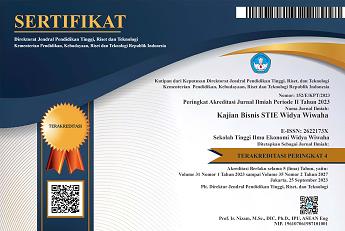PENGARUH DEBT COVENANT , BONUS PLAN , POLITICAL COST DAN RISIKO LITIGASI TERHADAP PENERAPAN KONSERVATISME AKUNTANSI PADA PERUSAHAAN MANUFAKTUR
DOI:
https://doi.org/10.32477/jkb.v25i1.146Keywords:
accounting conservatism, debt covenant, bonus plan, political cost, litigation risk.Abstract
This study aims to examine the influence of debt covenants, bonus plans, political costs, and litigation risks to accounting conservatism. Accounting conservatism is the dependent variable in this study which is measured by total accrual (before depreciation). The independent variables in this research include debt covenant, bonus plan, political cost, and litigation risk. The sample of this study is a manufacturing company listed on the Indonesia Stock Exchange during the period of 2010-2014. The sample in this study is determined by using purposive sampling method. The samples obtained in this research are 22 companies. Hypothesis testing is done by using multiple linear regression analysis method. Based on hypothesis test, it is concluded that the debt covenant variable proxied with leverage has no influence on accounting conservatism. Bonus plans proxied with managerial ownership structure have no significant influence on accounting conservatism. Political costs proxied with the firm size do not significantly influence accounting conservatism. The risk of litigation proxied with the firm measurement in terms of assets growth significantly influence accounting conservatism
Downloads
References
Alfian, Angga, “Analisis Faktor-Faktor yang Berpengaruh Terhadap Pemilihan Konservatisme Akuntansi”. Skripsi. Semarang: Fakultas Ekonomi Dan Bisnis Universitas Diponegoro.
Astarini, dwi. (2011), “Analisis Faktor- Faktor yang Mempengaruhi Pilihan Perusahaan Terhadap Konservatisme Akuntansi”. Skripsi. Jakarta: Fakultas Ekonomi Universitas Pembangunan Nasional “Veteran”.
Brigham, E. F., dan Joel F. H. (2009), Dasar- Dasar Manajemen Keuangan, Edisi 10, Buku 1, Terjemah oleh Ali Akbar Yulianto. Jakarta: Salemba Empat.
Givoly, D., dan C. Hayn (2002), Measuring Reporting Conservatism, http:// www.ssrn.com.
Kieso, D. E., Jerry J. W., and Terry D. W. (2009), Intermediate Accounting, 13th ed. John Wiley and Sons. Asia Pte. Ltd.
Lasdi, L. (2008), “Pengujian Determinan Konservatisme Akuntansi”. The 2nd National Conference, Universitas Katolik.
Oktomegah, Calvin (2012), “Faktor-Faktor yang Mempengaruhi Penerapan Konservatisme Pada Perusahaan Manufaktur Di BEI”. Jurnal Ilmiah Mahasiswa Akuntansi – Vol 1, No. 1, Januari.
Resti (2012), “Analisis Faktor-Faktor yang Mempengaruhi Konservatisme Akuntansi”. Skripsi. Makassar: Fakultas Ekonomi Universitas Hasanuddin.
Scott, W. R. (2009), Financial Accounting Theory, 6th ed, New Jersey: Prentice- Hall, Inc.
Watts RL., (2003a), “Conservatism in Accounting Part 1: Explanation and Implication”. Accounting Horizons 17 (3): 207-221.
__________, Zimmerman JL. (1986), Positive Accounting Theory, Englewood Cliff, New Jersey: Prentice Hall,
Widya (2004), “Analisis Faktor-Faktor yang Mempengaruhi Pilihan Perusahaan Terhadap Akuntansi Konservatif. Simposium Nasional Akuntansi VII. Bali”.
Wibowo, J. (2002), “Implikasi Konservatisme Dalam Hubungan Laba-Return dan Faktor-Faktor yang Mempengaruhinya”. Tesis. Program Magister Sains Universitas UGM. Yogyakarta.









